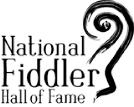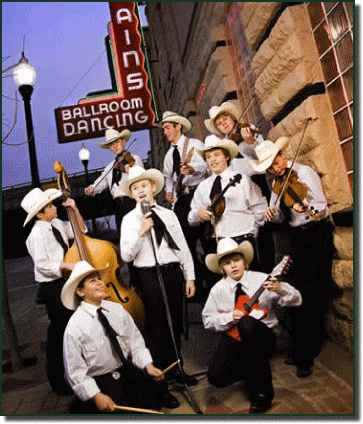|
|
|
|
|
|
|
|
|

Mentoring Program
The National Fiddler Hall of Fame
|
Mentoring Program: Oklahoma Stomp
Technology Helps Bring History Alive
When Shelby Eicher and Rick Morton first envisioned putting a Western Swing youth band together, they didn’t think about the amount of work involved in creating the authentic sound of the Texas Playboys. “It’s been a labor of love,” says Eicher. “But 20-25 years ago, I’m not sure this would have been possible. We’ve depended on technology a lot to make this happen.”
The first step was to transcribe music, which often wasn’t written down. Eicher spent some time with Texas Playboy, Curly Lewis, learning how he played and recording him playing some of the songs. The next step was to make arrangements that would work for the boys. “I needed to get the songs into keys that would work for the fiddlers and the vocalist.”
Once those arrangements were written, Eicher used a 20G hard rive digital 16-track recording system to lay down the tracks. “I would play the different parts and mix 7 or 8 tracks so they could hear the whole sound. Everything was played slower than performance speed so they could really hear the different parts. Their solos would be left out so they could play along with the band’s sound. And their band part was recorded extra loud at first and then absent so they could hear how it was supposed to sound and then play it.”
After that, Eicher sent the music and recordings via the internet. “The boys could import the songs and download them onto their iPods or burn a CD so they could listen to the music.”
Some of this technology was available 10 years ago but was prohibitively expensive. “There’s no question,” reflects Eicher, “technology has made it a lot easier to pass along and preserve this music.”

Oklahoma Stomp
Tulsa Kids (March 2007) - By: Beth Clary
It was said once that education was not about filling a pail, but lighting a fire. There is a fire being fanned here in Tulsa for nine boys, ages 12 to 16. The fire started 60 years ago, long before the boys were born, when Bob Wills and his Texas Playboys fused traditional fiddling with a little bit of country, jazz, ragtime, the blues and swing to create that sound so closely associated with Cain’s Ballroom in Tulsa – Western Swing. The flame is being fanned by Shelby Eicher, a local musician who serves as Director of Education for the National Fiddler Hall of Fame (NFHoF). Eicher has put together a band of boys to carry on the Western Swing tradition of Bob Wills.
The National Fiddler Hall of Fame’s mission, according to NFHoF materials, is to “establish and maintain a permanent National Fiddler Hall of Fame, to develop and promote public interest in old time fiddling, and country and bluegrass music.”
Presently the NFHoF offers outreach programs, including school performances and live demonstrations. The organizers are currently creating a National Faculty Database and a National Competitions Registry. In addition, the Hall of Fame’s Fiddle Conservatory is planning teacher training programs, fiddle camps, fiddle tours, concert series, and fiddle competitions.
Although NFHoF is currently without a physical structure, the organization is building a collection of fiddles and other artifacts and collecting documents, recordings and media to demonstrate the history and significance of the fiddle as an art form.
As the Director of Education, Eicher feels that one of the most important ways to keep traditional Western Swing alive is to encourage young people to listen to it, and to play it.
“It seemed that the only ones playing Western Swing were the old-timers,” said Eicher, “and I thought it was time to pass the torch.”
Eicher, and fellow musician and Assistant Education Director Rick Morton, discussed the possibility of creating a Western Swing band made up of kids as a pilot project for the NFHoF.
Both Eicher and Morton give instruction on various instruments in addition to judging fiddle contests. Because they follow the development of young musicians in the area and know several talented young people, they were able to put together a group of young solo musicians who were interested in playing in a Western Swing band.
“This would be a new experience for everyone,” Eicher explained. “Rick and I knew many of these boys have been competing against each other in contests for some time and we asked ourselves, ‘What would happen if we threw them all together? Bet we’d all learn a lot.’”
That was the beginning of nine boys becoming members of the Western Swing band Oklahoma Stomp!
The boys have set aside most of their Sunday afternoons and a weeknight or two since November to be a part of this pilot project to preserve some of Oklahoma’s history.
One of the members, Jake Duncan, 13, is a national fiddle contest winner and his resume of contest winning is long and mighty. The same is true for 14-year-old Eric Dysart and 13-year-old Douglas Thompson. These three boys have been fiddling and competing against each other for years. But, for the first time, they were asked to work on something together, along with six other young musicians who play everything from mandolin and bass to guitars and drums.
The hope in forming Oklahoma Stomp is to preserve a part of Oklahoma’s musical heritage in this centennial year, but also to provide an educational opportunity for talented young players to learn how to play with a large band. Specifically, they are learning how to let someone else play, how to play with a band, how to make the sound larger and are gaining skills in playing solos in a large band. In addition, they are learning special techniques that make Western Swing’s sound unique.
“It’s about learning to listen and interact with the other players,” said Eicher. “They not only have to know their individual parts, but they have to develop all kinds of new musical skills. For example, you can’t stop playing when you’re in a band – mistakes or not, you have to keep playing. It’s about collaboration, not just one person.”
For Jake Duncan, a Jenks’ 7th grader, collaboration has been one of the hardest parts, as well as his favorite thing. “I’m under a lot of pressure to know when to come in, especially for a solo. When I play in fiddle contests, I’m only playing along to my foot tapping. With Oklahoma Stomp, I have to listen to more than that.”
While Jake still loves preparing for fiddle contests and hopes to continue to compete in his 10 or more contests each year, he loves playing with the band. “The sound from the band is bigger...I just like that sound better. And meeting and playing with the other guys has been really great.”
Duncan has played with the local band the Round-Up Boys for some time, so he came to Oklahoma Stomp familiar with Western Swing music.
“But,” he explained, “I’ve learned a lot about the history of the music. It’s pretty cool to play the songs that people played all the time years ago – young people playing old songs – that’s important.”
The parents of these boys see an amazing amount of growth through this experience. Jake’s mother, Susan Duncan, said, “It’s been really tough to learn the teamwork that goes with this band. Each of them is depending on Jake and he on them in a way they haven’t experienced before.”
Steve Hardin, father of 12-year-old bass player Zac, agreed. “We’ve noticed Zac’s playing improve with all his music. This has renewed his enthusiasm for playing and he’s showing more musicality than ever.”
Zac, a 6th grader at Holland Hall, started playing bass just two years ago. He’s played classical music and takes classes in music theory at the Barthelmes Conservatory of Music in Tulsa.
“One cool thing about playing bass,” said Zac, “is that I have the opportunity to play many genres of music. And it’s really fun to play bass in Western Swing music because of the fast beat.”
Being the newest musician in the group has been a challenge for Zac. “The other kids have all been playing a lot longer, but I’ve been able to come to practices well prepared. And working with the band has helped me with my classical playing so much. I’m playing everything better.”
Another band member, 13-year-old Sterling Abernathy from Broken Arrow, couldn’t agree more. He’s been playing acoustic mandolin for four years, but has learned to play electric mandolin for Oklahoma Stomp.
“The electric mandolin has five strings instead of the four on an acoustic mandolin. So I’ve had to learn the Western Swing chords on a five-string mandolin. But that’s been the best part, too,” he added. “Sometimes I’m playing with the fiddles, or harmony with the guitars, or rhythm with the drums and bass – it’s been great to play together.”
“We’ve been lucky,” said Sterling’s mother, Karen. “These boys have gelled really well. They’ve all been so serious- minded about this project. They’ve taken the music Shelby has sent them over the internet (see sidebar) and downloaded it onto their iPods to hear the music and their parts. And they’ve all practiced so hard.”
In fact, all the boys willingly practice two to three hours each day on their instruments. This comes on top of regular days at school. Surprisingly, many of the band members play basketball and participate in other activities as well.
“These boys are talented musicians,” said Eicher, “but this required all of us to learn new things. After the first rehearsal, it was evident they were going to be great. So now it’s about helping them grow musically while preserving the sound that made Western Swing great.”
Steve Hardin agreed. “Any time a person can be exposed to different musical styles, it helps them grow musically,” he said.
Eicher has a philosophy about teaching, which he calls I.E.I: Instruct, Encourage and Inspire. “The order isn’t always the same but I hope the outcome is. In this case, I hope this is a learning opportunity these boys will remember forever as well as a way to preserve the history of this music by passing it along to the next generation.”
Zac Hardin said, “This has been such a great thing. Everybody should try to pick up a musical instrument. It’s been, for me, a great way to express emotions and relieve stress. Someone once said, ‘Half of the world is looking for Jesus and the other half wants more bass.’ I want both!”
“These boys love making music together,” said Steve Hardin. “It’s rare that a solo instrument sounds as good as a group effort getting together to make music. This has been an extraordinary opportunity for kids these ages to do this.”
When all is said and done, these boys have put in about nine, two- to three-hour rehearsals, as a band, to prepare for their performances in the next few months, not including their individual practice time.
“The objective has always been to give everyone a chance to shine and experience all the parts of being in a band,” Eicher said. “We have work to do, in part, because we’re trying to make their sound as authentic as possible. But in the end it’s all about how to get better at whatever you do.”
